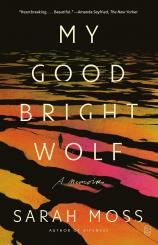My Good Bright Wolf: A Memoir
Review
My Good Bright Wolf: A Memoir
From her earliest days, Sarah Moss was admonished to be extremely careful about what she ate, to be overly concerned about her physical appearance, and to equate self-control and abstention with health and well-being. Even as a young girl, her weight and measurements were noted, commented on and judged by her parents. This fixation on size and shape --- and their supposed correlation to obedience, goodness, beauty and worth --- resulted in, as could be expected, lifelong disordered eating.
Moss’ memoir, MY GOOD BRIGHT WOLF, tackles her personal history, family mythology, path to recovery --- including various near-fatal setbacks --- and the places, people and stories that have offered her hope and models of resilience and healing.
"Mythmaking, truth telling, the search for meaning, the need for self-love and the acceptance of others all come together thematically in Moss’ astute and fearless, terrifying and gorgeous book."
Born in Scotland, Moss shares memories of her childhood with a style that is dream-like in its details but razor-sharp in its emotion. She names her parents The Jumbly Girl and The Owl and calls her brother, who is mostly a minor character here, The Angel Boy. These evocative nicknames are indicative of her feelings for, and distance from, her immediate family. Their voices are present not just in the action she recalls but in their italicized responses to her narrative. In chorus they argue against her retelling, scold her, and question her truthfulness and intentions. Their comments quiet to a certain extent as the book goes on, perhaps as Moss gains strength in the telling.
The middle third of the book moves away just a bit from Moss’ early experiences as she explores literature, particularly novels, that resonated with her over the years in a variety of ways. She begins with the Swallowdale and Amazons series by Arthur Ransome with its fascinating character, Susan. Susan is capable yet adventurous and is contrasted with her creative younger sister, Titty. Much of Susan’s care for her siblings comes in the form of food preparation, which she undertakes with pragmatism and precision. Mary, in Laura Ingalls Wilder’s fictional retellings of her life, is also the steady older sister, nurturing and learning to make do with little, as modeled by her mother and in contrast to her feisty little sibling.
Moss also examines the roles, or perhaps the types, of the March sisters in Louisa May Alcott’s LITTLE WOMEN. There, too, she finds various blueprints for femininity and an austerity not totally unlike the one that The Jumbly Girl and The Owl craft for their family. Her analysis, both personal and academic, delivers a compelling and intimate perspective to these classics.
In the last part of MY GOOD BRIGHT WOLF, Moss brings readers closer to the present day and her harrowing struggles with anorexia in adulthood. She is starving, weak, and yearning for an ideal of physical self that is really self-annihilation and eventual death. Even during and after medical and psychological intervention, including hospitalization, it is difficult to find balance, quiet harmful internal voices, turn away from destructive habits, and seek solace in family, work and art.
Mythmaking, truth telling, the search for meaning, the need for self-love and the acceptance of others all come together thematically in Moss’ astute and fearless, terrifying and gorgeous book.
The titular wolf in MY GOOD BRIGHT WOLF is Moss’ metaphor of power and substance, protection and truth. She imagines sending this wolf back to her younger self, to tear away the damage done through abuse and cultural norms. This is a dark book; rays of light are few and far between. But it is honest, poignant, thoughtful, brave and beautifully written, and is sure to strike a chord among many readers.
Reviewed by Sarah Rachel Egelman on November 1, 2024
My Good Bright Wolf: A Memoir
- Publication Date: October 21, 2025
- Genres: Memoir, Nonfiction
- Paperback: 320 pages
- Publisher: Picador
- ISBN-10: 1250397715
- ISBN-13: 9781250397713




